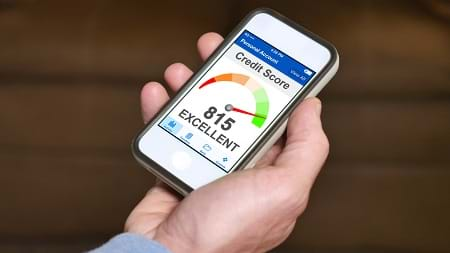
If there’s one piece of advice that landlords need to remember above all other advice, this is what we would say: Always take enough time to properly review rental applications before you offer to rent a property to any tenants!
No matter how great a tenant might seem when you first meet them, there’s always the chance that there is more risk associated with renting to them than you initially realize.
One step in the review process that can be a bit tedious or overwhelming for landlords is checking the credit of renters who are applying to stay at your property. Doing a tenant credit check isn’t necessarily difficult, but it can be confusing if you aren’t sure what to do or what you should be looking for.
Learning how to run a credit check on a tenant, however, is something that every landlord needs to learn how to do.
Today, we’ll go through the important information that you should know about credit checks, how to do them, and what your legal obligations are when dealing with this type of private information.
The Importance of Credit Checks
 Before we get into the details of how you can set a credit check-up for a potential tenant, let’s start with the basics. Why is it so important to do a credit check when you are deciding whether or not you want to enter a lease agreement with a renter?
Before we get into the details of how you can set a credit check-up for a potential tenant, let’s start with the basics. Why is it so important to do a credit check when you are deciding whether or not you want to enter a lease agreement with a renter?
The credit score and associated credit check report that you are interested in can give you a lot of information about a tenant. Mostly, this check will let you know a bit more about how financially responsible they are:
- Have they had many late payments?
- Are any of their accounts frozen?
- Do they have a history of bad checks, bankruptcy, or other concerning financial behavior?
Many tenants will not share this type of information upfront when they apply to live at your property. In fact, they may even try to conceal the information completely!
In order to feel truly secure in any tenant that you accept as a renter, you need to know that they have the responsibility and wherewithal to follow through on their end of the lease contract. After all, they will have a legal obligation to you just as you will to them, so you want to be sure that you can trust and feel confident in them.
A credit check can help you gain that trust and confidence, so the check is a great thing to include in your tenant screening process.
How to Check a Renter’s Credit
Now that you know a bit more about why all landlords should ensure that a credit check is part of their tenant screening process, let’s get into the details of how to actually run said credit check!
In our experience, you can run a credit check in two different ways. The methods that work best for you will depend on how many tenants you need to screen and the amount of time you have to invest, but they are all viable options for credit checks.
Method #1: Run It Directly
The first way that you can do a credit check is to pull the tenant’s credit report directly with a credit agency.
There are three credit bureaus that can be used to run a credit check:
- Experian
- TransUnion
- Equifax
All three of these credit bureaus are frequently used by landlords to get the information that they need about potential renters. To use the services offered by these specific bureaus, you will have to pay any associated fees and follow the rules that are laid out by the bureaus themselves.
Remember Every Credit Report Is Unique
The information that each bureau reports is specifically formulated by that bureau, and it will give a specific perspective about any one tenant. That perspective can change depending on where you view it from.
This means that the information you get you may be slightly different and dependent on the details that the specific bureau checks and stores. For that reason, many people find that they prefer to get the specifics from more than one bureau to ensure they can get the most complete picture possible.
If you are more of a completionist and want to be sure that you don’t miss any important details when doing a credit check, you may want to try method #2 instead. We’ll explain why when we address the benefits of using a specialized agency for these checks below!
Method #2: Use a Specialized Agency
Rather than running the credit check directly through a credit bureau, it is becoming more and more common for landlords to use a specialized agency to gather the information in a legal yet thorough way.
The simple fact is that there are a lot of rules you need to follow when you are dealing with someone’s financial history! Financial laws protect the privacy of the tenant, and you are in no way permitted to see or use certain classified information to make your decision.
The problem here is you may not always know the latest law or what is allowed to be included when you are making your final call about a tenant!
That’s where specialized tenant credit check agencies come in. These agencies specialize in credit checks and associated laws. They know exactly what information must be disclosed to a rental applicant, and they can help you make sure you stay in line throughout the process.
Another huge benefit of using an tenant screening agency like RentPrep to help with this aspect of your tenant screening is that they can give you context for the information you are seeing. Simply looking at a credit check or report might not immediately help you make any decisions, but the agency can make sense of what you’re looking at in their personalized report.
Find a Tenant-Driven Practice
Agencies like us here at RentPrep are what we like to call tenant driven. This means that the tenant gives authorization, fills out their information, and chooses who is allowed to see their information.
Having the check practice set up in this way ensures that the tenant is clearly educated about what information is being accessed, and that can help both parties stay far away from any confusion or legal involvement.
Legal Notes About Credit Check For Renters

As we’ve mentioned a few times, there are a lot of legalities that you need to follow when you are dealing with personal and private financial information. While you have a right to get permission to run a credit check, you don’t have free reign to do whatever you want with the gathered information.
The main things you need to get from your potential tenant when preparing to run a credit check are as follows:
- Full legal name
- Address history (at least for the two previous addresses)
- Social security number
- Employer name
- Former landlord name
- Date of birth
- Express permission to run a credit check
While the basic identifying information outlined above is important for being able to get fast and accurate credit checks sent to you, the main thing that you need to focus on getting is clear permission from the tenant that you are permitted to run a credit check. Usually, landlords will have tenants sign off on this on their rental application.
The Fair Credit Reporting Act requires that you do two main things:
- Get permission from the tenant before running the credit check
- Give them the information needed to get their own copy of the credit report
Whether you decide to rent to the tenant in question or not, you are legally required to give them the opportunity to see the same report that you see. To ensure that they have this chance, landlords should give tenants a copy of the contact information for the organization that will be running the report.
Rejecting a Tenant for Credit Score Reasons
This requirement to give the reporting agencies information to an applicant is especially important if you decide to reject them because of something that you saw on their credit report.
If you reject someone on the basis of their credit information, you are legally required to tell the tenant what aspect of their credit report caused you to make this decision. Then, you must give them a copy of the report and information about how to contact the bureau that compiled the report.
Why is this the case?
Simply put, it is possible that something is wrong with the tenant’s credit report or they did not know that something had been reported in a particular place. By disclosing the information that led you to make your decision, you can help ensure that consumers like your tenants retain the utmost control over their financial future.
The rental application credit check is not just about what you need from the report, but about what is happening with a tenant’s financial information.
How To Understand Tenant Credit Check Results
Once you have the credit check report in your hands, you are still likely to have some questions. What do all of the shown details mean? Are there any specific areas you should look at to ensure you make the right choice?
To decide whether or not the tenant is worth the risk of renting to, you need to break down the information presented in the report. It’s more than just looking at a credit score or a credit score range.
When you are reviewing the report, we suggest that you focus on these three areas.
Determine Late Payment History
By viewing the information about specific loans or credit accounts, you will be able to find out if the tenant has made late payments in the past. Find out how late the payments were and how many times payments were made late.
Late payments do not necessarily tell you that the tenant will always pay late. If, for example, all of the late payments happened during a specific period and never again, it’s probable that the tenant went through a rough patch financially but has learned from it.
If, however, the tenant has shown late payments, again and again, that is a stronger cause for concern about their financial reliability.
Consider The Whole Picture
Does the tenant’s credit check show any negative items that you might need to be concerned about? On the first page of the report, you should be able to see negative indicators about specific issues. These would include things labeled as past due, discharged, or in collections.
If you see more than two items on this list, there’s a good chance that the tenant would be a high-risk tenant because of their financial history.
Look For Evictions, Foreclosures, and More
Tenants with a history of bankruptcy, eviction, or foreclosure should be thoroughly vetted before you decide to rent for them. It’s true that hard times can come down on good people, so having one of these things on their record does not need to immediately remove their application from the pool.
However, having a continued history of these issues can give you some indication of how renting to this tenant might be, so keep that in mind when making your final tenant selection.
Clarify Any Confusion
If you have a hunch about a tenant and feel that they will make a good choice for your future tenant, sit down with them and clear up any lingering confusion. If they have a good credit score at this time but have shown a history of late payments in the past, find out if there is any explanation behind the issues highlighted in the report.
While a credit check can help you find out about a potential tenant’s true financial past, a document doesn’t give the entire picture, so it is always good to follow up with the tenant when possible.
Get Your Tenant Screening On!
Screening rental applicants is a must for landlords who want to protect their business, their properties, and their bottom line. If a tenant is causing you grief about getting their credit check, you can be fairly sure that they aren’t the right tenant for you.
Take the time and file the reports you need to in order to make the most informed decision possible when selecting your next renter. Legal agreements such as a lease contract are serious affairs, so you should take some serious time to ensure that you make the right selection. Tenant screening can be scary, but reports like a credit check can help.
Learning how to run a credit check on a tenant applicant is an essential part of the process, and we hope that today’s guide has simplified the issue for you!

